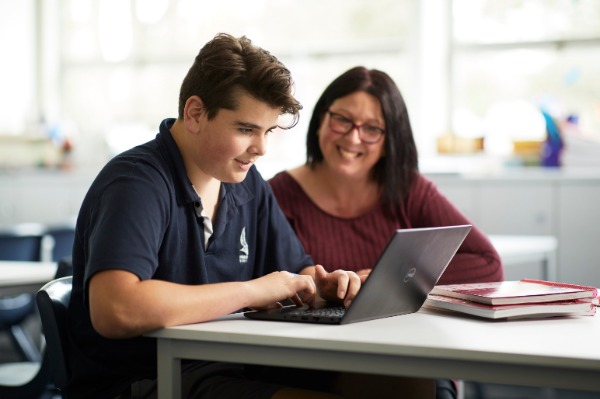Inclusive Education
Who are we and what do we do?
Dave Bennett (Senior Leader - Intervention & Support)
Emma Robinson (Inclusive Ed Manager).
Home group teachers or individual class teachers are the first point of contact for support inquiries. Dave and Emma work in conjunction with each of the Year Level Leaders, the Wellbeing Team, teachers, SSOs and outside agencies to coordinate a range of supports for students.
Curriculum SSO Team
The team provides in class support and small group and individual student support in a variety of ways.
How do we work?
The Inclusive Education team works with students, parents, teachers and leaders to provide support to students with disabilities. This can include a range of different strategies and interventions such as:
- delivery of the MacqLit literacy intervention program to small groups for identified students
- numeracy support – this can occur in various ways depending on students/ cohorts needs
- development and implementation of One Plan’s in conjunction with the student, parents and staff
- one to one subtle classroom support to students with direct funding
- social skill development through What’s the Buzz – with Teenagers?
- development of self-regulation skills, including the management of ‘big emotions’ utilising Interoception strategies
- hazard identification and strategies for keeping themselves safe
- use of the Learning Tools functions on students’ laptops
- development of skills and strategies to independently prompt themselves on to the next step in their learning
- sensory support
- physical needs support – oral eating and drinking, transitioning and positioning
Dyslexia Supports
Our teachers utilise the following core strategies to support students with Dyslexia:
- use of Microsoft Learning Tools on students' laptops (see link below). These tools include speech to text, text to speech and many other functionalities
- Subject specific direct vocabulary instruction
- Use of audiobooks where possible
- Writing scaffolds and explicit teaching of different text types
- Graphic organisers
Further individualised supports for students with Dyslexia are also used, based on their diagnostic assessment report recommendations.
Useful links:
https://multilit.com/programs/macqlit/ is an explicit and systematic reading intervention program for small groups of older low-progress readers. It provides teachers with a comprehensive sequence of lessons that includes all the key components necessary for effective reading instruction: phonemic awareness, phonics, fluency, vocabulary and comprehension.
https://www.education.sa.gov.au/schools-and-educators/curriculum-and-teaching/curriculum-programs/applying-interoception-skills-classroom Interoception is a pre‐requisite skill for self‐management and self‐regulation. It provides the tools to know when we are developing emotional reactions and the skills to be in control of these reactions.
https://www.microsoft.com/en-au/education/products/learning-tools Learning Tools use a set of free features that enable every student to improve writing, reading comprehension, and reading speed.
https://www.speld-sa.org.au/ a non-profit organisation that provides advice and services to support children and adults with specific learning difficulties such as dyslexia.
https://www.autismsa.org.au/ the organisation prides itself on strong values-driven culture of empowerment of, and support for, individuals living with autism.
https://whatsthebuzz.net.au/main-menu/content-whats-the-buzz-with-teenagers a highly practical programme designed to explicitly teach young people to get along and maintain healthy relationships with their friends, family and the broader community. Is a deeply structured resource to teach young people in the 12 to 15-year-old developmental range.







